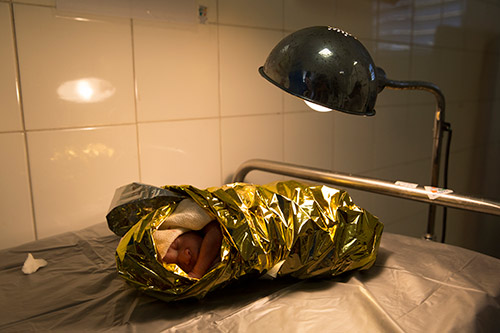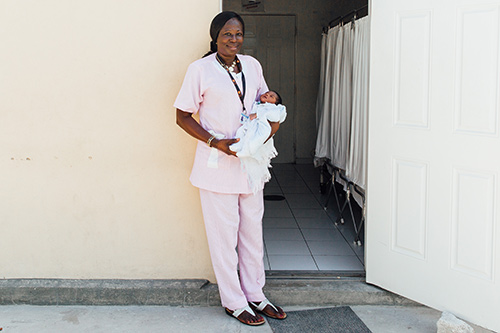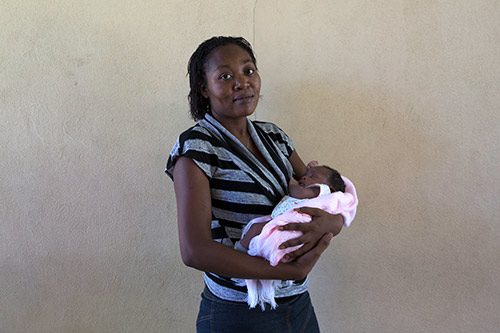News
Slashing Haiti’s maternal and infant death rates, one delivery at a time
- 26 February 2015
News
NEW YORK/PORT-AU-PRINCE – “I love everything about being a mother,” said Loilobies, a pregnant woman in Port-au-Prince, Haiti. Yet to become a mother, she and other women in the country assume unacceptably large risks: Haiti’s maternal and infant death rates are the highest in the Western hemisphere.
These tragedies are needless. “There really shouldn’t be any deaths, but sadly, in [many] cases, there still are,” said Amoin Soulemane, a midwife at the UNFPA-supported clinic where Ms. Loilobies receives care.
According to the most recent estimates by UNFPA and partner UN agencies, a woman in Haiti has a one in 80 chance of dying due to pregnancy or child birth, compared to the region-wide risk of one in 510. The infant mortality rate is 59 deaths for every 1,000 live births, according to the country’s most recent demographic and health survey (DHS).

There are many reasons women and infants in Haiti face these inflated risks. Chief among them are crushing poverty, poor health infrastructure and lack of access to health care. About half the population has no access to basic health services at all.
Frequent natural disasters have also eroded the availability of life-saving maternal health care. The country remains the site of a major humanitarian crisis, with tens of thousands of people still displaced by the country’s 2010 earthquake, and thousands more affected by recent flooding.
There are highly effective interventions for all five of the major causes of maternal death – severe bleeding, sepsis, eclampsia, obstructed labour and unsafe abortion. Yet not enough women are able to access this care.

Only 36 per cent of births in Haiti take place in health facilities, and only 37 per cent of women give birth under the care of a skilled birth attendant – such as a doctor, nurse or midwife – who is able to recognize and address complications.
UNFPA is working with the health ministry and other partners to bring these numbers up. Since 2012, UNFPA has supported maternity hospitals and clinics around the country, each capable of providing basic but life-saving, emergency obstetric and neonatal care. These maternity centres – often called ‘Smile Clinics’ – are among the most active in the country, and are serving as a model facilities for the health ministry.
“This is my first child, and I decided to deliver in the clinic because it gives good service,” said Youseline, a new mother at Petite Place Cazeau, one of the ‘Smile Clinics’. The facilities also offer family planning services, programmes to combat gender-based violence, and HIV-treatment services.
Programmes like these, in conjunction with broader development efforts, are slowly working. There has been a 43 per cent decline in Haiti’s maternal mortality rate since 1990, and infant mortality is estimated to be falling by about 3 per cent annually.
But much more remains to be done.
Long-term improvements to maternal and infant health will require a stronger workforce of trained health personnel.

UNFPA supported the construction of a new earthquake-resistant National Midwifery School, after the previous school was flattened in the 2010 quake. Still, many more trained health workers are needed. Recent estimates indicate that only 10 per cent of midwifery needs in the country are being met by the current workforce.
A new partnership between UNFPA and TOMS aims to remedy this. Through TOMS’s One for One promise, funds from the TOMS Bag collection sales will support the training of skilled birth attendants.
And to ensure safe deliveries are available for women who lack access to health centres – particularly those affected by humanitarian crises – support from TOMS will also be used to distribute clean delivery kits.
“We say that it’s better for women to deliver in clinics to mitigate risks,” said Ms. Soulemane, the midwife, explaining that UNFPA and ministry health officials encourage institutional delivery to ensure the safest possible conditions during childbirth.
But, she added, “the kit helps because it contains materials to help women in the event they cannot get to a clinic to deliver. There is a clean surface, gloves, a cord clamp and antibacterial soap.”
These measures, and dedicated professionals like Ms. Soulemane, will help more women enter motherhood with joy instead of fear.
“I am so excited to be a mother for the first time,” said Pierra Eva, holding her newborn daughter at Ms. Soulemane’s clinic. “I want to teach her everything I know. There is nothing better than being a mom.”